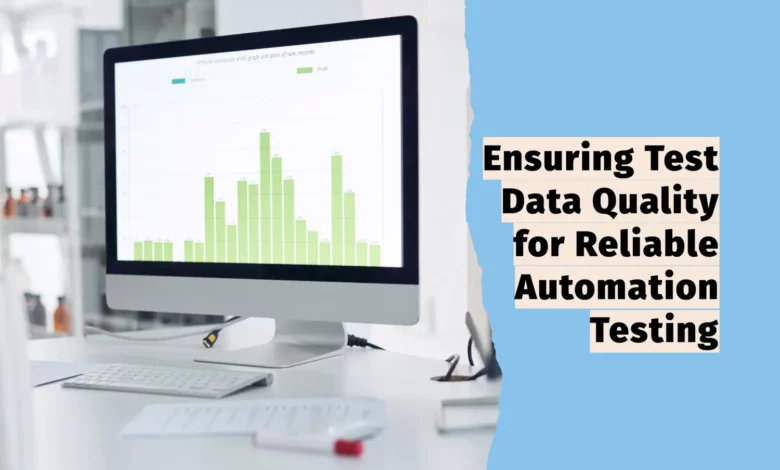
The modern testing infrastructure has revolutionized a lot to keep up with the changing technologies and emerging trends in this segment. For instance, automation testing has become one of the most dominant trends in the modern app development and testing industry. Other than integrating test automation, the developers also have to integrate advanced testing processes like cross-browser testing, regression testing, and parallel testing. While executing modern test cases, the developers have to consider multiple variables like the hardware and software combinations of the device. Moreover, the requirements of the target audience also play a crucial role in this process.
So, with this article, we are going to understand how app developers can ensure test data quality for executing reliable automation testing. We will also understand some other important parameters that the developers can implement in this process to uplift the reliability and productivity of the overall testing environment.
Table of Contents
Importance of Maintaining Test Data Quality
Maintaining the quality of test data is one of the total factors in the modern software development industry. Let us go through some of the most important reasons that can justify this claim:
- Accuracy of Test Results: By implementing high-quality test data, the application testers can ensure that all the tests performed are accurate and reflect real-world scenarios. By implementing this accuracy, they can also identify the vulnerabilities in the system, find bugs, and critical performance issues within the software.
- Improving the Reliability of Automation Testing: Automation testing is an advanced testing process that massively relies on the dependency of pre-written test data. So, by providing consistent and reliable data, the app developers can ensure that the testing environment is devoid of common errors like false positives and false negatives. These errors can lead to unreliability in the testing environment and compromise the overall quality of the product.
- Implementation of Test Coverage: By implementing high-quality test data, the app developers can massively expand the coverage of the application. This data also ensures the developers that there is a dedicated test case for verifying the functioning of all the elements present in the app.
- Reducing the Efforts for Test Debugging: The implementation of high-quality test data ensures that the developers massively reduce the risk of errors and bugs in the core infrastructure of the application. This process also ensures that developers and testers have to invest minimal time and effort in the debugging process that will follow soon after. Moreover, the test data will also provide sufficient context and information required for troubleshooting and resolving the issues effectively.
- Validating the Behavior of the System: High-quality test data helps the testers validate the behavior of the system when it is exposed to a testing scenario. This process also ensures the software performs as expected under multiple conditions. So, the overall implementation of high-quality test data helps guarantee the reliability and functionality of the test environment.
Reasons for Implementing Automation Testing
Automation testing is an advanced process that helps the testers execute automated testing instances using pre-written test scripts. Using these test scripts, the system can emulate human interactions while communicating with the system. The developers can also implement the required customizations to ensure the accuracy of the test cases according to the policy requirements. Let us now understand the reasons for implementing automation testing in the modern software development environment:
- Elevating the Testing Speed and Efficiency: By using automation testing, app developers can massively improve the efficiency of the test cases compared to manual testing. The quick implementation of test cases also allows the execution of faster feedback cycles on code changes which helps in quick iterations and development phases.
- Consistency and Repeatability: Since automation testing does not rely on the implementation of human knowledge, it massively improves the consistency of the overall testing environment. Moreover, it is also highly efficient in detecting bugs and issues that might be present in the core architecture of the application. It is one of the most crucial factors that helps app developers to maintain the consistency of the application over a longer period
- Implementation of Cost-Effectiveness: While implementing automation testing, the application developers can reuse over 60% of the existing test data. So, it helps app companies to massively improve their financial stability and save a lot of costs related to the application testing phase. Moreover, the implementation of automation testing also eliminates the requirement of having an on-site human testing team.
- Scope of Regression Testing: Modern apps undergo a frequent updating process that allows the developers to constantly add new features to elevate their standards. In certain cases, the new elements can hamper the functioning of the existing elements of the app. So, by implementing automated regression testing, the app developers can ensure that the code infrastructure of the app is stable and ready to be forwarded to the production phase.
- Optimizing the Resources: By automating mundane and repetitive test cases, quality assurance teams can focus on complex, unique, and exploratory testing that requires the expertise and creativity of a human tester. This process also allows the app developers to develop new features that can be included in future versions of the application.
- Scope for Agile Development: While using automation testing, app developers can also include advanced parameters like continuous development, continuous testing, and continuous integration. The most important benefit of this process is that it allows the developing companies to perform the development and testing processes simultaneously. So, the testers can detect the bugs in the early phases before they turn into serious issues to the core application architecture.
Ensuring the Quality of Test Data for Executing Reliable Automation Testing
To guide the new automation testers, we have created a list of some of the most important parameters that can help them maintain optimal test data quality for executing reliable automated test cases:
1. Implementation of Relevant Data
We would advise the app developers to use real-world data wherever possible. This is because fabricated or synthetic data might not reflect the actual scenarios accurately. In case the real data is not available, the developers must ensure the synthetic data is generated with a clear understanding of the system’s requirements and the possible use case scenarios. While implementing this parameter, the developers must also account for certain unpredictable parameters like user interaction errors or physical faults in the device.
2. Ensuring the Completeness of the Data
It is the industry belief that test data must cover a wide range of scenarios and use cases. So, the testers must ensure that this data includes both normal and boundary conditions. This process will help them to verify the system’s behavior when it is exposed to multiple use cases. Moreover, it is also important to understand how the system behaves when it is exposed to additional users or overloaded traffic.
3. Integration of Tools and Platforms
Various modern tools and platforms can help the developers not only generate high-quality data but also help maintain the consistency of the test data. For instance, the developers can integrate cloud platforms to ensure that they can conduct real device testing without investing in an onsite device lab. This is because using cloud platforms, the developers can run the test cases on thousands of real devices through remote servers. These servers are not only accessible all around the globe but also provide access to outdated devices for improved app compatibility.
Modern AI based test orchestration platforms such as LambdaTest also have additional features for ensuring reliable automation testing like execution of parallel test cases, maintenance of a live activity log, and keeping track of all the bugs with a native bug tracker. This platform also generates a comprehensive test report so that the developers can easily debug all the bugs and errors that might be present in the core framework of the application.
4. Use of Data Maintenance
It is not just enough to generate high-quality data but also important to ensure that the developers properly maintain this data for future use. So, it is important to regularly update the data and check for any inconsistencies. The modern automation testers should also remember that with the evolution of the system, the data will also evolve. By using outdated or irrelevant data, the developers will not be able to effectively test the new features or changes that have been implemented in the code framework of the application.
Moreover, the use of outdated data can pose serious risks to the data privacy or integrity of the application architecture. Modern apps like health apps and banking apps store a lot of sensitive user data which needs to be properly secured to ensure any form of malicious attack or breach of user privacy. Finally, we would advise the app developers to regularly check the data to ensure that it complies with the changing trends and certifications of the modern software market.
5. Ensuring the Consistency of the Data
The application testers and developers must ensure the consistency of the testing data across different testing environments. Some of the most important environments include the development, staging, and production environments. Any form of consistency in these environments can lead to unreliable test results that can lead to a faulty application being rolled out to the production phase. In this regard, the developers can also consider the use of automated tools or scripts to generate the test data. This process can help in not only elevating the testing consistency but also improving the scalability of the overall environment.
6. Use of Collaboration and Documentation
By implementing the above strategies, the application developers can elevate the quality of the test data. This process will lead to more reliable automation testing and better validation of the system’s functionality. We would advise the developers that certain strategies might vary depending on their preferences and the requirements of the application that is currently being developed. So, it is crucial to have a complete understanding of the development project and its parameters.
The Conclusive Views
Conclusively, we can easily say that maintaining the quality of test data is one of the most important parameters that allows developers to ensure the stability of modern automation test cases. Regarding this parameter, developing companies should also conduct workshops and seminars that can help them spread the required knowledge about modern testing practices. The developers and testers should also stay updated with all the recent trends and innovations in this segment. Practices like these are crucial for maintaining the company’s position in this competitive segment of the industry. It will also help them to continuously expand their user base and create a positive reputation for the brand.



